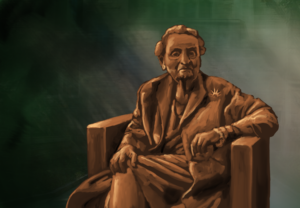In the glow of the afternoon sun through stained-glass windows, Gaston Hall was full of reunions and memories. Chatting above the hum of a piano, old friends embraced each other for the first time in a long time at the memorial of Georgetown professor Dr. Ricardo L. Ortiz.
It was Friday, Sept. 19 when the Georgetown community honored the life of Ortiz with poetry, song, and reflections on the legacy of a man who devoted so much of himself to the university. Opening the ceremony, Dean David Edelstein of the College of Arts and Sciences (CAS) commemorated Ortiz for his scholarship after over 25 years of teaching at Georgetown.
“Ricardo was loved by so many, and in turn loved so many,” Edelstein said. “Today we gather, both to mourn the loss of that love and to celebrate it.”
Paul O’Neill (CAS ’86, MPP ’96), Ortiz’s fiancé and partner of four years, said Ortiz was never more himself than when he was in the classroom.
“Not everyone has had the same opportunities when they arrive at Georgetown. And he saw the classroom as a great equalizer,” O’Neill said in an interview with the Voice. “He loved teaching and he also realized that he had the opportunity to help transform students like him in the way that he was transformed.”
O’Neill explained Ortiz was inspired to become a teacher after his undergraduate experience at Stanford University, where he was absorbed into an intellectual community that challenged him.
“He saw in his teachers there that there was a way that you could make your life and your work the same thing—that you could create a vocation,” O’Neill said. “The ability to just get paid to pour out to students something that you feel passionately about and are excited about.”
Beyond being a great professor, Ortiz was a great friend to many. Amanda Phillips, associate professor of English at Georgetown, considered him a part of their family.
“He touched so many lives in such authentic ways that I think everyone who felt close to him was actually close to him,” Phillips said. “I think he did actually give a piece of his heart to everyone.”
Brian Hochman, director of Georgetown’s American Studies program and a professor of English, similarly emphasized Ortiz’s devotion to others both within his profession and the wider Georgetown community.
“He put his whole self into his work at Georgetown, and it’s why so many students and also so many faculty feel such a sense of loss,” Hochman said. “He was a prince of a man—just such a warm, generous, fun person.”
Born in Cuba on Sept. 23, 1961, Ortiz immigrated to Los Angeles when he was five years old, starting school without knowing a word of English.
“That moment I think really was a formative one for him. He was a stranger in a strange place, not speaking the language, and he had to cope,” O’Neill said. “And the way that he did that primarily was through literature. He was a voracious reader from the very beginning.”
Ortiz took with him his passion for reading and learning through his degrees in English and Economics, his masters and doctoral degrees at University of California, Los Angeles, and his professional life, working at San Jose State University and Dartmouth College before coming to Georgetown in 1998 to teach English.
Beyond his love of learning, Ortiz also carried his family history with him everywhere he went.
“Ricardo was an immigrant and working class. That was his identity, and he never really left that identity,” O’Neill said.
Ortiz’s experiences as a minority growing up in the United States drew him to different spaces for marginalized students on campus, such as the Georgetown Scholars Program, Community Scholars Program, and La Casa Latina. He was also a pivotal figure in the creation of the LGBTQ Resource Center on campus in 2007, as one of Georgetown’s first openly gay professors.
“He was a queer faculty member at Georgetown before it was cool—before it was safe, really,” Phillips said. “I can only imagine what a beacon of light he would have been to students who felt like they had no other place to go.”
In addition to advancing how the university supported their queer community, Ortiz shaped the faculty at Georgetown as a member of several different hiring committees, bringing on professors who could fill institutional gaps.
“There was a whole movement among students for years to hire more faculty who could teach Latinx history, Latinx culture,” Hochman said. “You know, ‘We need more queer faculty. We need more queer of color faculty.’ Ricardo was there.”
Along with Hochman, Phillips was a professor hired by a committee that Ortiz was on.
“He took me under his wing and I learned the institution through him. I learned how to be a grown-up professor by following his example,” Phillips said. “For students and faculty colleagues alike, he had a very special way of seeing people and making people feel seen, in ways that weren’t overbearing.”
Jennifer Luzon (CAS ’23) was mentored by Ortiz when completing her American Studies senior thesis, which explored undocumented artists and writers using visual art and poems to reclaim their stories.
“I wouldn’t have been able to complete my thesis without him. He was very inspirational,” Luzon said. “He had the best ideas, and he always pushed me to look deeper into the stories and how that connected into my own life.”
Patrick O’Malley, chair of the English Department, stressed that beyond Ortiz’s influence as a teacher and friend, he was an incredibly important scholar.
“He was, for a group of scholars across the country, also important as a researcher and a writer and a theorist,” O’Malley said. “He was publishing and he was an important scholarly voice in Latinx studies, in queer studies and in humanities, and in particular in literature.”
Associate Professor of History and American Studies Mireya Loza explained as a scholar of Latinx history, Ortiz had a keen eye in thinking about sexuality and gender when interrogating this past, demonstrated in his first book, Cultural Erotics in Cuban America.
“He made sure in Latinx studies that many of us were reminded that queer communities are central and not marginal to our projects,” Loza said.
Phillips stressed the importance of his role beyond the academic world.
“He was a part of the intellectual life, of building Latinx studies, but he was also just a heartbeat in the community,” Phillips said.
In lieu of flowers, attendants of the memorial were encouraged to donate to the recently created Ricardo L. Ortiz Humanities Fund, inspired by Ortiz’s devotion to the humanities and his work as a founder and director of the Master of Arts Program in Engaged and Public Humanities at Georgetown.
“Especially in a world that’s so challenged by conflict, the ability of the humanities to transform people and to bring joy and to bring understanding was essential in Ricardo’s mind,” O’Neill said. “He really had a reverence for the humanities.”
Additionally, the American Studies program named the Teaching and Mentoring Award after Ortiz, as an acknowledgement of his dedication to the program and mentoring senior theses. The award was started in 2023 to recognize professors for outstanding work with American Studies students.
“It really does embody the spirit of the kind of work that he did at Georgetown, work that went over and above the official teaching and service load for members of the Georgetown faculty, and also work that is interdisciplinary, serving students who are doing different kinds of scholarship and research,” Hochman said.
Father Kevin O’Brien, former vice president for Mission and Ministry at Georgetown who spent time with Ortiz on retreats and in spiritual reflection, described Ortiz as a man deeply committed to Georgetown’s Jesuit values.
“Particularly in his care for students, his commitment to bridging education and justice, and then exemplifying those values personally,” O’Brien said. “His care of students, and what we call, in the Jesuit tradition, cura personalis, caring for each student in their uniqueness, in mind, body and spirit.”
Ortiz passed away on Aug. 18, 2025 at the age of 63, after suffering from a heart attack. He is survived by his sisters, Ana Mercedes and Ana Rosa, his nephews, Andrew, Colin, and Daniel, and his niece, Isabella.
His nephew Colin Sevely-Ortiz spoke at his memorial, describing one aspect of his “tío” that stood out in his memory: Ortiz’s thoughtfully crafted Facebook posts, especially those reflecting on Ortiz’s parents whom he lost at an early age.
“I find in that public grieving, he’s provided us with a lesson plan on how to grieve him,” Sevely-Ortiz said at the ceremony.
O’Neill recalled, even after 27 years, Ortiz would come home from Georgetown “just bouncing about the great class” he had taught that day—and he never got tired of it.
“He believed in the students who came every year with their great intellect, their curiosity, their enthusiasm, and their potential to flourish. He would do whatever it took to make sure that flourishing was possible year after year,” O’Neill said. “There are few people who are more tireless than Ricardo was—and he did it because he loved the place.”






